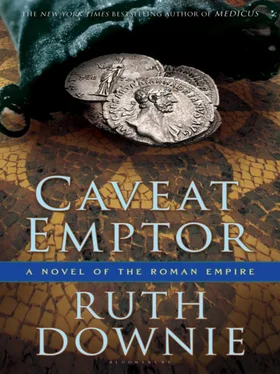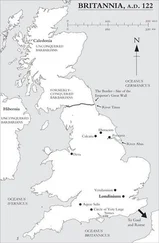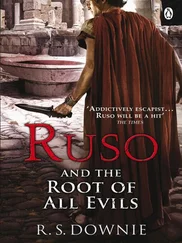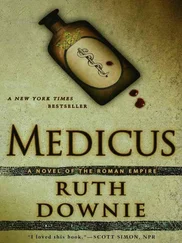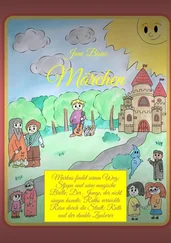Ruth Downie - Caveat emptor
Здесь есть возможность читать онлайн «Ruth Downie - Caveat emptor» весь текст электронной книги совершенно бесплатно (целиком полную версию без сокращений). В некоторых случаях можно слушать аудио, скачать через торрент в формате fb2 и присутствует краткое содержание. Жанр: Исторический детектив, на английском языке. Описание произведения, (предисловие) а так же отзывы посетителей доступны на портале библиотеки ЛибКат.
- Название:Caveat emptor
- Автор:
- Жанр:
- Год:неизвестен
- ISBN:нет данных
- Рейтинг книги:3 / 5. Голосов: 1
-
Избранное:Добавить в избранное
- Отзывы:
-
Ваша оценка:
- 60
- 1
- 2
- 3
- 4
- 5
Caveat emptor: краткое содержание, описание и аннотация
Предлагаем к чтению аннотацию, описание, краткое содержание или предисловие (зависит от того, что написал сам автор книги «Caveat emptor»). Если вы не нашли необходимую информацию о книге — напишите в комментариях, мы постараемся отыскать её.
Caveat emptor — читать онлайн бесплатно полную книгу (весь текст) целиком
Ниже представлен текст книги, разбитый по страницам. Система сохранения места последней прочитанной страницы, позволяет с удобством читать онлайн бесплатно книгу «Caveat emptor», без необходимости каждый раз заново искать на чём Вы остановились. Поставьте закладку, и сможете в любой момент перейти на страницу, на которой закончили чтение.
Интервал:
Закладка:
There was another, more modest pyre already burning on the other side of the clearing. A little knot of mourners clustered around it defensively as the crowd and the noise swelled. Tilla approached one of them. “This was your child?”
“Six years old,” said the woman. “She had a fever.”
“I am sorry.”
The woman looked at the baby. Tilla was glad she did not try to touch him. You could never tell how bad luck might spread. The woman said, “Treasure that one while you can, sister.”
Six years old. Six years of caring for a child, only to lose her as so many were lost to illness and accidents against which neither midwife nor the Medicus had any power.
She had not yet found the right time to tell him that she had woken late in Serena’s room with a familiar dragging sensation in her lower belly and risen to confirm that the medicine had failed. She would wait until they were well away from this place to break the news that the child who lived only in their hopes was as far away as ever.
Tilla moved back toward the fresh pyre on which the slaves were laying the shrouded form of Camma. On the far side of the clearing, a squad of guards was forcing its way to the front of the crowd, making way for Gallonius, here to be seen yet again paying his respects. As if anyone was likely to care. She recognized Gavo and, behind him, lurking in the third row, Dias. Even here, she thought, he cannot leave us alone. She wanted to march up to him, wrench the spear from his hand, and shout, “That child over there was six years old! Is there not enough death and misery without men like you dealing out more?”
When the slaves had done their work, Caratius stepped forward and unwrapped the shroud to reveal Camma’s face. Dias was looking across the pyre with a smug expression. Tilla followed his gaze and realized it was aimed at Grata. Grata’s expression was sullen, but what could one woman do? As if he had asked and answered that question himself, Dias gave her a half smile and turned to say something to the man next to him.
The Medicus appeared on the far side of the circle, out of breath and seemingly lost in his thoughts. If he did not do something soon, their final duty in this place would be over. They would be on their way back to Londinium with a shameful tale of fear and deceit, but also with the news that the tax would be paid, which was very likely all anyone would care about. The procurator would accept the tax and then send the money north to pay the army, who were there to keep her own people under the emperor’s thumb.
If there was any honor in this place, it was very well hidden. She would be glad when the Medicus went back to treating the sick.
He was moving now. Striding across the grass to say something to Caratius, who looked surprised and annoyed, and who finally said something brief in return. Then the Medicus stepped aside and Caratius moved forward to stand at Camma’s feet, facing the pyre. The onlookers fell silent. Everyone wanted to know what a man could say to honor a wife who had abandoned him for a tax collector.
“You are Camma of the Iceni,” he announced, “and you were my wife.”
Someone close to Tilla put in, “Till she ran off with a thief!” and several people sniggered. The comedian, a short man with buck teeth, grinned and took a swig from a flagon. Caratius said, “You are beautiful in death as in life.” The comedian surfaced from the flagon and managed to get out, “And you stole our money!” before Tilla snatched the flagon and hurled it onto his foot. His howl mingled with the sounds of mourning from the other pyre.
Caratius was still speaking but nobody seemed to be listening. There was some sort of disturbance behind them. A dozen horses and riders had broken out of the woods and were thundering across the grass toward them. Someone shouted, “The Iceni!” There were screams of “The Iceni! The Iceni have come!” as the crowd scattered, mothers grabbing children and dragging them away in search of safety. Some headed for the slaves’ hut, some tried to hide among the graves, and others rushed back toward the road and the town gates. Valens and Serena had snatched up the twins and were running for the carriage. Dias was yelling orders to the guards, who gathered around Gallonius.
Suddenly Grata was standing beside Tilla, with Albanus firmly in front of them both as if he stood some chance of defending them. Caratius was left unprotected beside the pyre as the riders circled around it. Their eyes were fierce. Their scars spoke of old battles and their long swords of readiness for new ones. All wore rough clothes topped with thick leather jerkins to protect them against weapons, and it was a moment before Tilla realized that a couple of them were women. She stood her ground, trying not to be afraid. These were her friend’s people: the family she had summoned. One of the women had hair like Camma’s, and also like the baby she was clutching against herself in case the Iceni chose to seek revenge on the nearest people they could reach.
The Medicus had not run, either. He was walking around the pyre toward her when a rider with thick fair hair roared in British, “Who is responsible for this?”
Dias gave an order and the town guards raised their spears. They were probably wishing they too had armed themselves with their swords. Well, that was what happened when you groveled to Rome.
“You!” the leader shouted at Caratius. “We trusted her to you, old man.”
Caratius was looking stunned, as if he could not understand what was happening.
Tilla called, “This is not his doing!”
The leader turned to glare at her and gestured with a tattooed hand to Albanus to get out of the way.
Albanus visibly jumped with fright, but he stayed where he was. Tilla put a hand on his shoulder and stepped around him to stand beside the horse. “I am Darlughdacha of the Corionotatae among the Brigantes,” she told the man, using the name he would understand. “Sometimes called Tilla. I am the midwife.” She held up the baby. “And this is your kin.”
He did not bother to look at the baby. “You sent the letter.”
She said, “I had hoped to give you a happier welcome.”
The Medicus was almost beside her now.
“Who is responsible for the death of my sister?” He glanced at the Medicus, swung around, and jabbed the point of the spear against his chest. “You,” he said in Latin. “Keep still. Tell us why my sister is dead.”
From behind the safety of other men’s spears, Gallonius shouted, “Your sister brought shame on you. She deserted her husband and ran off with a thief.”
The Iceni had stopped moving about now. Everyone was listening.
“You’re the thief,” called the Medicus.
Gallonius’s body jolted in sudden outrage, or perhaps fear. “I am the one trying to keep order here!”
Ruso turned to Caratius. “He told me both your grandfathers were craftsmen, sir-they were metalworkers, weren’t they?”
Caratius nodded. “What of it?”
“His meat market is on the site of your grandfather’s workshop, and everyone knew about the buried silver. I think he found it after your own men’s digging disrupted the drainage.”
“Nonsense!” put in Gallonius. “I’ve never seen any silver.”
“You showed some of it to Satto and said it was your savings.” The Medicus turned to Caratius, talking faster and faster, trying to get his story out before he was stopped. “That’s how he knew the old money could be identified, so he started melting it down and making his own, but the forgeries weren’t good enough, so he forced Nico to switch them with the theater fund money-”
“Enough!” roared the Iceni leader, giving the Medicus a poke with the spear that sent him staggering backward.
Читать дальшеИнтервал:
Закладка:
Похожие книги на «Caveat emptor»
Представляем Вашему вниманию похожие книги на «Caveat emptor» списком для выбора. Мы отобрали схожую по названию и смыслу литературу в надежде предоставить читателям больше вариантов отыскать новые, интересные, ещё непрочитанные произведения.
Обсуждение, отзывы о книге «Caveat emptor» и просто собственные мнения читателей. Оставьте ваши комментарии, напишите, что Вы думаете о произведении, его смысле или главных героях. Укажите что конкретно понравилось, а что нет, и почему Вы так считаете.
